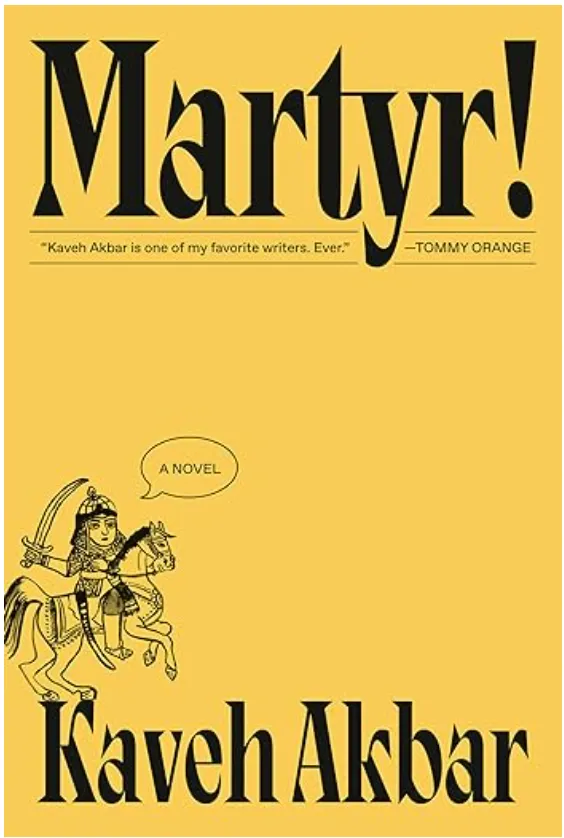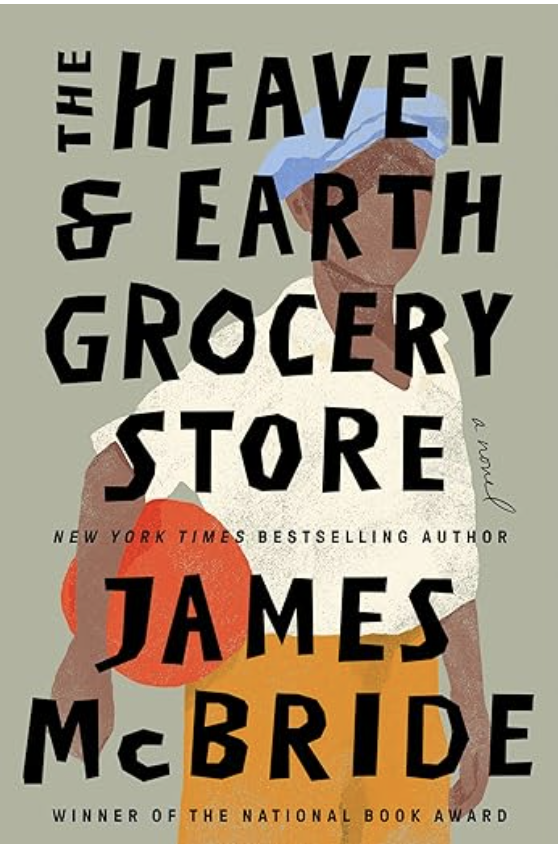
This week’s reviews include Kaveh Akbar’s debut novel “Martyr!,” and Richard Roper’s “This Disaster Loves You.”
Published by Knopf (January 23, 2024)
Hardcover $23.59
Audiobook $12.99
By Ashley Riggleson/ FXBG ADVANCE
Kaveh Akbar’s debut novel, Martyr! is one of the most talked about books of January and with good reason. This distinctive and poignant novel about a young man’s search for meaning tugged at my heartstrings, and I did not want it to end. I loved it.
Readers primarily follow Cyrus, the son of Iranian immigrants. He is a recovering alcoholic who struggles with his mental health and the ordinary work of living. It seems, in fact, that he wants to die, but he wants his death to mean something. As the novel progresses, Akbar takes readers back into the past to learn how Cyrus gets to this point. We learn, for instance, that his mother was deeply unhappy in her marriage to his father and that, when Cyrus was young, his mother died when her plane was shot down by the US military, one of many lives lost. And, while his father was a good provider, he was emotionally distant, and Cyrus’ childhood was a lonely one. Additionally, Akbar shows that Cyrus’ problems are, in part, the result of Iran’s tumultuous history and of his feelings about growing up as an outsider in the United States. Akbar also does an excellent job of showing how all these factors contribute to making Cyrus the man he is at the beginning of the novel.
There is a plotline that takes place in the novel’s present as well. Cyrus is preoccupied with trying to have a good death, one that matters. As he works on a book about the martyrs of the past, he comes across the story of an artist called Orkideh. Like Cyrus, she has Iranian roots, and she is at the Brooklyn Museum in the midst of her final installation, a visual art piece called “Death-Speak.” Orkideh is suffering from terminal cancer, and she spends her final days talking with anyone who visits her there. Cyrus’ friend Zee suggests that he meet her, so they soon go to New York. Here, he realizes that he and Orkideh have more in common than he ever suspected. And, while Cyrus originally traveled to New York to learn about dying, in the end, he learns something about living.
Martyr! is a beautiful novel about redemption and healing, and Akbar, who is also a poet, writes beautifully as well. That said, Martyr! is not for everyone. It is a character driven novel with a very quiet plot. Akbar expects the reader to engage in this novel and give it their full attention, and he uses its extraordinary premise to discuss topics like race, the importance of art, Cyrus’ intrinsic value, mental health, and addiction. With that in mind, readers should also be warned that Martyr! has many potential triggers, including suicide, suicidal ideation, illness, grief, addiction, and more. Despite the challenging subject matter though, Martyr! is sometimes joyous and always perfectly wrought. Readers will not forget Akbar’s debut anytime soon.
Ashley Riggleson is a free-lance book reviewer from Rappahannock County. When she is not reading or writing book reviews, she can usually be found playing with her pets, listening to podcasts, or watching television with friends and family.
THIS DISASTER LOVES YOU
BY RICHARD ROPER
Published by G. B. Putnam’s Sons (February 13, 2024)
Paperback $16.20
Audiobook $12.99
Reviewed by Drew Gallagher
The first part of Richard Roper’s This Disaster Loves You has side-splittingly funny moments. If your significant other dragged you off the couch to see a similarly plotted stage play you would have bought your significant other a drink at intermission and given them an affectionate squeeze. You’d recount some of the better lines together and privately wonder if maybe buying a countryside pub in England was a path you and your significant other should consider.
Grab another pint before the house lights flicker and see how the playwright was going to bring this comedic classic to a satisfying conclusion. Life is grand. Cheers!
Oh, but you should have paid a little closer attention to Lily leaving Brian there in that beginning part. Sure, they were the idyllic couple for 20 years in Brian’s mind, but women don’t generally disappear from wedded bliss for seven years without a word. Even if you, the reader, love the narrator because he is relatable and self-effacing, such as when he recounts a college relationship that he was never certain on what level he was participating.
“Our time together consisted mainly of sitting in cafes in strained silence, as if we’d been married for thirty years and had run out of things to say to each other. The physical side of the relationship had been even more baffling to me. We would occasionally kiss in the chaste manner of 1950s film stars, but I had only once built up the courage to take things further as we lay on the unforgiving single bed of her dorm room. Completely guessing at what I was supposed to do, I found myself pressing my hand to her bottom and then just…leaving it there, as if I were trying to guess the weight of a cake at a village fete.”
Lily offered far more than cake weighing and broke Brian out of the drudgery of a life devoted to the insurance industry (note to book reviewer—avoid mirrors posing as books). They talked often about their future together, so when they happened upon a “dream pub,” they moved from London into the countryside to live happily ever after. Except, we soon learn that Lily may not have shared Brian’s joy or vision of a future pouring pints. In literature classes, this is known as an unreliable narrator.
After Lily vanishes, Brian sits around for seven years waiting for her return until one of the pub’s patrons reminds him that there is a life to live. Sit or get off the pub stool. And Brian has recently happened upon some breadcrumbs during internet searches which lead him to believe that Lily is posting reviews of places and things while touring stops in Great Britain. He needs to find her and figure out what went wrong and, hopefully, bring her home.
The plot devices that Roper employs are not novel (adventures in solo travel with comedic opportunities just around the corner at: fill in the blank with a pub, restaurant, or local tourist site). Roper’s wit and humor, however, set this book apart as Brian follows his path to a more nuanced ending than we may have anticipated at intermission.
Ultimately though with this life of Brian, always look on the bright side.
Drew Gallagher is a freelance writer residing in Fredericksburg, Virginia. He is the second-most-prolific book reviewer and first video book reviewer in the 137-year history of the Free Lance-Star Newspaper. He aspires to be the second-most-prolific book reviewer in the history of FXBG Advance and is also a founding member of Dads for Puppies.





